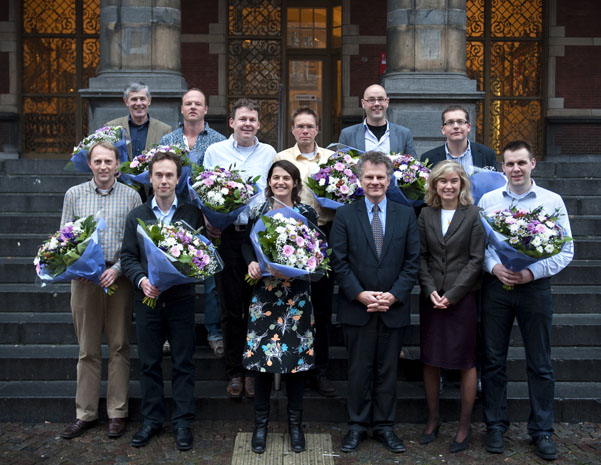ERC laureaten in het zonnetje gezet
Onderzoekers van de Rijksuniversiteit Groningen die dit jaar een ERC grant kregen toegekend, zijn afgelopen week in het zonnetje gezet. Zij werden feestelijk ontvangen in het Academiegebouw en beëdigd tot lid van de University of Groningen ERC Club. Maar liefst negen onderzoekers waren uitgenodigd omdat ze dit jaar een prestigieuze Starting Grant van de European Research Council (ERC) wisten te verwerven; de twee andere genodigden omdat ze een ERC Advanced Grant kregen toegekend.

De Starting Grant laureaten ontvangen elk een budget van ongeveer anderhalf miljoen euro van de ERC voor grensverleggend onderzoek met een looptijd tot vijf jaren. De toelage stelt hen in staat om onafhankelijk onderzoek te verrichten met een team dat ze nieuw kunnen vormen of uitbreiden. De winnaars van een Advanced Grant krijgen elk een bedrag van rond de 2,5 miljoen euro.
Creatief en gedreven
Het ERC-programma is bedoeld voor de meest creatieve en gedreven onderzoekers van alle wetenschapsterreinen. Zij worden geselecteerd op slechts één criterium: excellente kwaliteit. De laureaten zijn dan ook veelal verbonden aan de hoog geklasseerde onderzoeksinstituten van de universiteit, zoals het Zernike Institute for Advanced Materials, het Stratingh Institute for Chemistry, de top-onderzoekschool NOVA waar het Kapteyn Instituut voor Sterrenkunde bij is aangesloten of het medisch-biologische onderzoeksinstituut ERIBA (RUG/UMCG).
RUG koploper met Starting Grants
Nederland is zeer succesvol in het behalen van de ERC-onderzoeksubsidies. Dit jaar gingen 47 Starting Grants naar onderzoekers van Nederlandse universiteiten. Dat is bijna tien procent van de in totaal 480 grants, die bij elkaar een waarde vertegenwoordigen van 670 miljoen euro.
De Rijksuniversiteit Groningen neemt bij het verwerven van ERC-grants een bijzonder plaats in. Ten opzichte van de Nederlandse universiteiten scoort Groningen voor de vierde jaar op rij wederom uitstekend. Met 19 toekenningen sinds 2007, toen de eerste ERC call gepubliceerd werd, is Groningen de universiteit met verreweg de meeste Starting Grants. Afgelopen jaar was het slagingspercentage op Europees niveau rond 13 procent. Voor de Rijksuniversiteit Groningen lag dat percentage op ruim 25 procent.
Meer informatie: drs. Neeltje Miedema
Binnen de Rijksuniversiteit Groningen wordt door ERC-consultant drs. Neeltje Miedema van het EU-team van de Transfer and Liaison Group samen met de reeds gevestigde ERC-laureaten advies gegeven aan aspirant laureaten om hun talent te vertalen en rijp te maken voor de verwerving van ERC-projectfinanciering. Zij werkt hierbij samen met andere afdelingen binnen de universiteit (Academische Zaken en Human Resources), met Bureau Onderzoek van het UMCG en met AgentschapNL.
Meer nieuws
-
26 februari 2026
Vici-beurs voor hoogleraar Neurobiologie Marieke Wermer
-
17 februari 2026
De lange zoektocht naar nieuwe fysica
